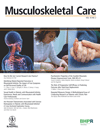Identifying Patient-Reported Outcomes in Rheumatoid Arthritis: The Impact of Foot Symptoms on Self-Perceived Quality of Life
Abstract
Background
The importance of patient-reported outcome measures in healthcare is increasingly recognized but these need to be patient generated. Given that foot symptoms are very common in rheumatoid arthritis (RA), we chose a patient-centred model with which to investigate the patients' perspective on how their foot symptoms affected them as individuals and impacted on their self-perceived quality of life, rather than using the traditional approaches of clinical examination (e.g. prevalence of deformities) or radiological assessments.
Methods
A 33-item self-administered postal questionnaire was sent to all people with RA attending outpatient clinics in three hospitals over the course of one month (n = 390). The questionnaire used both quantitative and qualitative approaches to enquire about the nature and extent of foot complaints and how respondents believed this affected their quality of life.
Results
In total, 190 usable replies were received (49%). Nearly all respondents (n = 177; 93.2%) reported that their quality of life was adversely affected by their foot complaint(s), with over half describing their quality of life as being badly or very badly affected. When asked to rate how severely foot complaints affected their quality of life using a 10 cm visual analogue scale, the mean score was 5.36 (range 0–10 ± SD 3), indicating that foot complaints have a moderate-to-severe effect on quality of life. Those aspects of daily living most significantly affected were: the ability to walk and the ability to wear a variety of shoes.
Conclusion
This study demonstrated that people with RA focus on different aspects of the impact of their disease to doctors. Rather than foot deformity or ulceration, disease activity score or health assessment questionnaire score, patients were easily able to pinpoint the key negativities of living with RA in their feet and indicated choice of footwear and ability to walk as crucial. This study and similar ones are key to identifying appropriate patient-reported outcome measures. Copyright © 2012 John Wiley & Sons, Ltd.




